25 June 1753: The Moravian Brethren of Fulneck, Pudsey, refuse to participate in the toll-bar riots
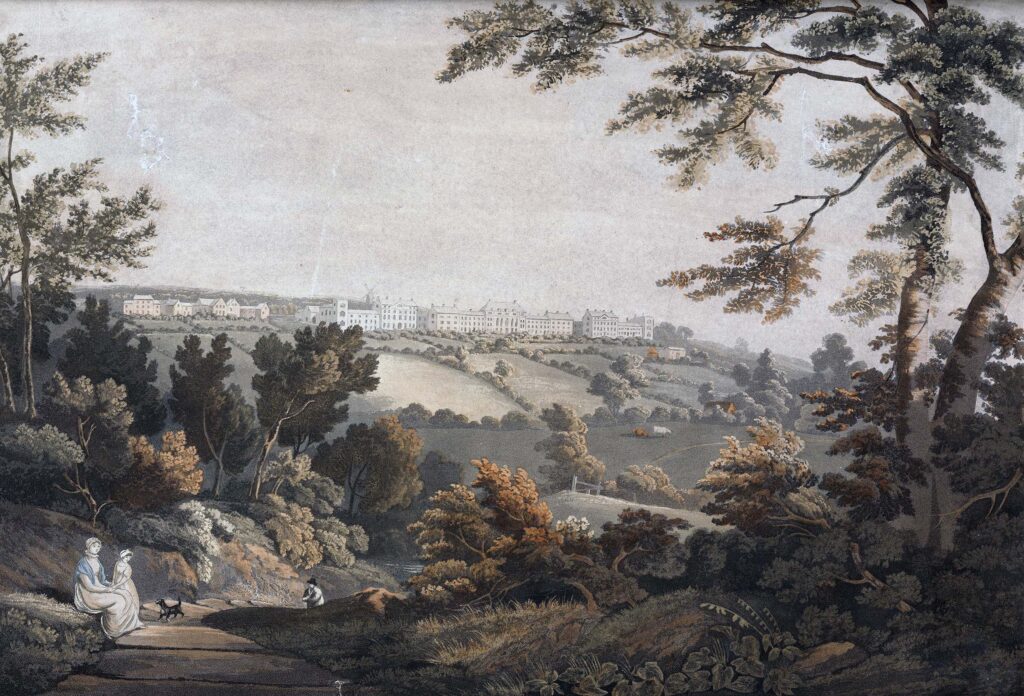
Aquatint by R. Havell from a painting of Fulneck Moravian Settlement by Charles Henry Schwanfelder (Schwanfelder 1814).
Simeon Rayner. 1887. The History and Antiquities of Pudsey. Ed. William Smith. London: Longmans, Green and Co. Get it:
.Unedited excerpt
If an excerpt is used in the book, it will be shorter, edited and, where applicable, translated.
On June 25th, 1753, between seven and eight o’clock a.m., a woman, who was dignified with the office of Pudsey town-crier, made her appearance in the quiet village of Fulneck, rang her bell vigorously, and then proclaimed that the inhabitants were expected to join the people who had risen for “King and country,” adding that if this request were not attended to, a visit would be paid to enforce the behests of King Mob. Accordingly, at nine o’clock a multitude of about a hundred men, women, and children poured in, and insisted that the single brethren should at once join them. Armed with clubs and staves, they rushed hither and thither, shouting and blowing lustily on a horn. Brother Benjamin La Trobe went among them, conversed in a friendly way, but quietly informed them they need not expect to find there what they wanted; for, to join them in their present doings would be contrary to the principles of the Brethren. They lingered about the houses for a while, and then one party went up to Tong, and presented themselves before Squire Tempest, who gave them money and refreshments. Ere this party returned, five or six of the leaders came again to the Brethren’s house, and repeated their demand. Brother La Trobe intimated that if the Brethren could be helpful to them in any legal way it would gladly be done, but that they could not approve of any such irregular proceedings, nor in any wise abet those who took part therein. On his presenting them with half-a-guinea they went away, pledging themselves that no damage should be done to the settlement or its inhabitants. Soon after their withdrawal, the other party returned from Tong, and when a meeting took place on the Green, near the Low House, they concluded to make another attempt at the Brethren’s house, and deliberated also on the steps to be taken in case of a refusal. Brother La Trobe, however, met them at the gate, at the end of the lane, and, after a hard talking match, prevailed upon them to withdraw. They rushed off to Lane End, and conducted themselves there in a somewhat rough fashion. At last, finding they could not effect their purpose, they left the neighbourhood, but first compelled those who had accepted any money at Fulneck to return and deliver it up, declaring they had not come for “brass,” but only for “t’lads.” Still they held out the threat that after joining another body of sympathisers who had been waiting for them beyond Pudsey, they would show their faces again and let the “Fall neckers” see what they would do to them. Thus they withdrew, not the slightest damage having been inflicted, whilst in the settlement every heart and every mouth was filled with praise to the Saviour for His protecting care. When in the evening the poor misguided people reached their homes in Pudsey, some were in a wretched condition, having been wounded in hands, arms, and shoulders, when attacking a gentleman’s house, which they intended pulling down. Several of the mob had been made prisoners, and were taken off to gaol; of course this cast a gloom over the township, but it proved a wholesome discouragement to the rioters. [From “The Messenger, a Magazine of the Church of the United Brethren,” May, 1870, pp. 156-8. Editor, Rev. C.K. Sutcliffe, a native of Pudsey.]
Comment
Comment
In the middle of the last century, the roads in the neighbourhood of Bradford, were in a most disgraceful state, being almost impassable. From time to time, indictments were presented against these roads at the Quarter Sessions; but without any permanent benefit. At length several acts of Parliament were passed for the making of turnpike roads hereabouts. The erection of the turnpike caused many riots. Among the papers of an old inhabitant of Bradford, long since dead, was found the following notice of ‘Rebecca’s’ first visit to Bradford:
A brief account of the disturbances occasioned by the turnpikes. Upon Monday, the 18th of June, 1753, a mob arose from several parts, but chiefly from Yeadon and Otley, and the adjacent places, and pulled down a turnpike at Bradford Moor end, and afterwards attempted to destroy Bradford turnpike: the same day, they destroyed one at Apperley Bridge. On the 22nd, they assembled again, and were joined by many hundreds of people, from most parts of Bradford parish, when they tore down a turnpike at Tyresal Moor end, and burnt it and the house together; the same day, they burnt one at Newil Hall, and Wibsey Bank Foot turnpike house, and Bradford turnpike shared the same fate. At last, they beset Mr. Balme’s house, and behaved in a very irregular and unseemly manner. Saturday, the 23rd, they pulled down Kirkstall turnpike and house, and burnt them together: the same day, they burnt the house at Halton Dial. On Monday, the 25th, they assembled near Revey Beacon: a very considerable company went and pulled down Beggerington turnpike and house, and burnt them together: the same day, they burnt the turnpikes and houses at Belly Bridge, Bridgehouse, Cleggheaton, and two others. In the same evening, there was a skirmish at Harewood, where about half a score of the movers were taken and sent to York; also a body of 100 soldiers was detached from York to Bradford. 26th: about 100 soldiers came from Manchester to Bradford, and the other detachment was withdrawn. The remaining days of this week were spent in meetings of the Commissioners, to consult what was to be done, and apprehending such of the mobers as could be met with only. About Wednesday, Beeston turnpike was burnt. Saturday, the 30th, a mob arose in or about Leeds, and attempted to rescue some of their companions, when under confinement, and began to commit some outrage; upon which the soldiers were obliged to turn upon them, at first, (as was reported) with powder only, but the mob, seeing it did no execution, raged still the more: after that, with small shot, which had much the same effect; at last they were obliged to load with ball, and, I believe, several were slain; but so various were the reports, that I much question whether ever a true account was known, even in Leeds. It was said on Sunday, July 1st, viz, the day following, that there were fifteen killed, and two or three times that number wounded, but there are others that affirm the loss was far more considerable. At the following assize, all that had been imprisoned on account of the turnpikes were set at liberty; but about the latter end of August and September, they burnt by night most of the country turnpikes, viz, at Belly-bridge, Bridge-house, Apperleybridge, Stock-bridge, Holme Lane-end, and some others. And several of the above were burnt twice over, and some, I believe, three times over, after the assizes were over.
Brother La Trobe is presumably close family of Benjamin Henry Latrobe, architect of the US Capitol and a native of Fulneck. Several more Moravian links for investigation: 1/2.
Something to say? Get in touch
Similar
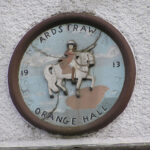 23 January 1643: Thomas Fairfax, the Rider of the White Horse, captures Leeds from the Beast with the help of Psalm 68
23 January 1643: Thomas Fairfax, the Rider of the White Horse, captures Leeds from the Beast with the help of Psalm 68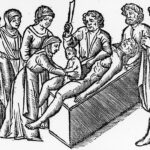 29 December 1759: In an unusual case of genitive determinism, “Julius Caesar” Ibbetson – painter at first of ship’s hulls and later of landscapes – is delivered from his dead mother at Farnley Moor (Leeds)
29 December 1759: In an unusual case of genitive determinism, “Julius Caesar” Ibbetson – painter at first of ship’s hulls and later of landscapes – is delivered from his dead mother at Farnley Moor (Leeds)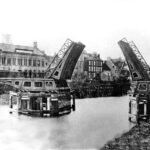 1 July 1840: The opening of the Hull and Selby Railway terminates the threat to Hull’s port from Goole, Scarborough and Bridlington
1 July 1840: The opening of the Hull and Selby Railway terminates the threat to Hull’s port from Goole, Scarborough and Bridlington
Comment
Comment
Something to say? Get in touch
Search
Donate
Music & books
Place-People-Play: Childcare (and the Kazookestra) on the Headingley/Weetwood borders next to Meanwood Park.
Music from and about Yorkshire by Leeds's Singing Organ-Grinder.


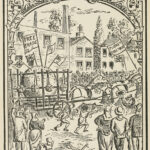
 Bluesky
Bluesky Extwitter
Extwitter